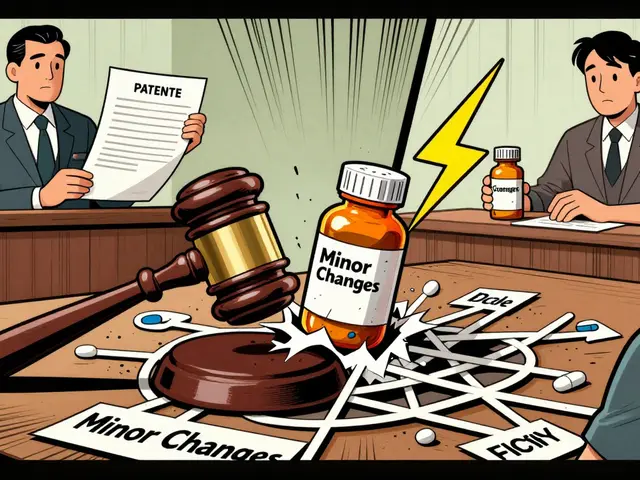Understanding Central Pain Syndrome
Central pain syndrome is a neurological condition that affects the central nervous system, causing chronic pain. It is often characterized by intense burning or aching sensations, which can be triggered by even the slightest touch. The pain can be constant or intermittent, and it can affect any part of the body. Central pain syndrome can be caused by various factors, such as brain or spinal cord injuries, strokes, or multiple sclerosis. It can greatly impact a person's quality of life, making it crucial to find effective ways to manage the pain.
What is Baclofen?
Baclofen is a muscle relaxant and antispastic medication that is commonly used to treat muscle spasms, stiffness, and pain in patients with various neurological conditions. It works by inhibiting the transmission of nerve signals to the muscles, which helps to reduce muscle contractions and spasms. Baclofen is available in oral tablet form and can also be administered intrathecally, which means it is delivered directly into the spinal fluid through a pump.
The Connection Between Baclofen and Central Pain Syndrome
There is a growing interest in the potential use of Baclofen as an effective treatment option for central pain syndrome. This is because Baclofen has been proven to be effective in reducing spasticity and muscle pain in patients with other neurological disorders, such as multiple sclerosis and spinal cord injuries. Additionally, some studies suggest that Baclofen may also help to alleviate neuropathic pain, which is a type of pain that is commonly experienced by individuals with central pain syndrome.
How Baclofen May Help Manage Central Pain Syndrome
While the exact mechanism by which Baclofen may help manage central pain syndrome is not yet fully understood, there are several theories. One theory is that the drug's ability to reduce muscle spasms and contractions may help to alleviate the pain associated with central pain syndrome. Another theory is that Baclofen may help to modulate pain signals in the brain and spinal cord, which could potentially provide relief from the chronic pain experienced by individuals with this condition.
Research on Baclofen and Central Pain Syndrome
There are limited studies on the use of Baclofen specifically for central pain syndrome. However, some case reports and small-scale studies suggest that Baclofen may be effective in alleviating neuropathic pain in some individuals with this condition. For instance, a study published in the journal Pain Medicine found that intrathecal Baclofen administration led to significant pain relief in a patient with central pain syndrome due to a spinal cord injury. More research is needed to determine the effectiveness of Baclofen in managing central pain syndrome and to establish optimal dosages and treatment protocols.
Potential Side Effects of Baclofen
As with any medication, Baclofen may cause side effects in some individuals. Common side effects of Baclofen include drowsiness, dizziness, weakness, and nausea. Less common side effects may include confusion, headache, insomnia, and constipation. In some cases, Baclofen may cause more serious side effects, such as seizures, difficulty breathing, or hallucinations. It is essential to discuss the potential risks and benefits of Baclofen with your healthcare provider before starting treatment.
Important Considerations When Using Baclofen for Central Pain Syndrome
If you and your healthcare provider decide that Baclofen may be a suitable treatment option for your central pain syndrome, there are some important considerations to keep in mind. First, it is essential to follow the prescribed dosing schedule and to never abruptly stop taking the medication, as this can lead to withdrawal symptoms. Additionally, it is crucial to monitor your response to the medication and to report any side effects or concerns to your healthcare provider promptly. Finally, remember that Baclofen may not work for everyone with central pain syndrome, and it may take some trial and error to find the most effective treatment plan for your specific situation.
Other Treatment Options for Central Pain Syndrome
While Baclofen may be a promising treatment option for some individuals with central pain syndrome, it is important to remember that there are other treatment options available as well. These may include medications such as antidepressants, anticonvulsants, and opioids, as well as non-pharmacological interventions such as physical therapy, psychological counseling, and alternative therapies like acupuncture or biofeedback. It may be helpful to work with a multidisciplinary team of healthcare providers to develop a comprehensive pain management plan tailored to your specific needs and preferences.
Conclusion
In conclusion, Baclofen may be a potential treatment option for managing the pain associated with central pain syndrome. Although research is limited, some studies and case reports suggest that the medication may be effective in reducing neuropathic pain in some individuals with this condition. It is essential to discuss the potential risks and benefits of Baclofen with your healthcare provider and to consider other treatment options as well. With the right treatment plan in place, it is possible to improve your quality of life and better manage the chronic pain associated with central pain syndrome.





Daniel Rogers
I was skeptical at first, but baclofen changed my life. After years of constant burning pain from a spinal injury, this stuff finally gave me some relief. Not a miracle, but it let me sleep again and even take walks without wincing. 🙌 Don't give up if one med doesn't work - keep talking to your doc.
Chris Remo
baclofen is wild. i tried it after my stroke and it didn't touch the pain but it killed my muscle cramps so hard i could finally sit in a chair for more than 10 mins. weird how one drug does two totally different things. still taking it just for the spasticity tbh.
Michael Herr
Intrathecal baclofen pumps are not to be taken lightly. I had mine implanted two years ago. The difference is night and day. No more constant screaming pain. But the surgery was brutal and the maintenance is a nightmare. Worth it though.
Crystal Magnant
I tried baclofen and got so dizzy I couldn't stand. My neuro said it's common but I just couldn't deal. Ended up going with gabapentin and acupuncture. Not perfect but I can function now. Everyone's body reacts differently so don't get discouraged if it doesn't work for you 😌
Danie Joy
baclofen is just a distraction. the real cause of central pain is 5g towers and chemtrails messing with your spinal fluid. they dont want you to know the truth because big pharma makes more money off you being in pain. i stopped taking all meds and now i drink apple cider vinegar and meditate. pain gone. they hate this.